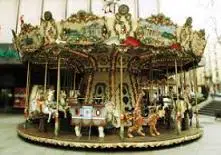Before getting to know the meaning of the term carousel, we are going to proceed to discover its etymological origin. In this case, it must be stated that it is a word that derives from the French “carousel”, which in turn comes from the Italian “carosela”. However, it should not be overlooked that the latter also derives from Arabic, specifically from “kurradj” which can be translated as “horse game for children”.
A carousel is an entertainment that has a rotating structure with seats that are usually shaped like animals or vehicles. This is a children's game that is very popular at fairs and parks .
 The seats on the carousel (also called merry - go-round ) often move up and down as the platform rotates. This way, if a child is sitting in a horse- shaped seat, he or she will feel like he or she is riding.
The seats on the carousel (also called merry - go-round ) often move up and down as the platform rotates. This way, if a child is sitting in a horse- shaped seat, he or she will feel like he or she is riding.
Carousels generally have music : as they spin, a melody is repeated over and over again to accompany the ride. In some regions it is common for children, while on the carousel, to be challenged to catch an object known as a ring which, if picked up, allows access to another round of the entertainment free of charge.
The carousel is believed to have emerged among the Crusaders as a training method . The riders practiced attacking dummies or trying to hit targets while a structure mobilized by horses or men rotated.
Over time, carousels became a means of entertainment, first in the gardens of royal homes and then at fairs. At the beginning of the 19th century , the carousel was already popular in several European countries.
“Carrusel” , on the other hand, is the title of a famous Mexican soap opera, inspired by the Argentine series “Señorita maestro” . Broadcast between 1989 and 1990 , it revolves around the experiences of a group of children at their school. “Carousel” had a sequel ( “Carousel of the Americas” ) and a Brazilian version ( “Carrossel” ).
In the same way, we cannot ignore the existence of an important radio program that exists in Spain and that has the word in question in its title. We are referring to “Carrusel Deportivo”, which is broadcast on Cadena SER and has its origins in the 1950s.
Specifically, in 1952 the first program in that space that focused on sports was broadcast. It is broadcast on weekends from 3 to 11:30 p.m. and fundamentally revolves around what football is. Hence, it addresses the different days of both the Santander League and League 1, 2, 3. However, it also usually leaves space to talk about basketball, specifically the Endesa League.
Dani Garrido is the director and presenter of this radio program where there are collaborators of the stature of Kiko Narváez, Michael Robinson, Santiago Cañizares, Rafa Alkorta, Alfredo Relaño, Eduardo Iturralde González, Tomás Roncero and Gustavo López.
